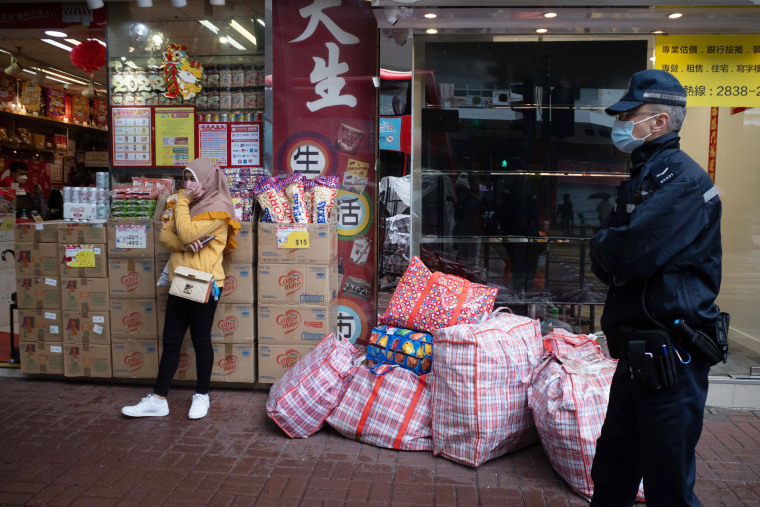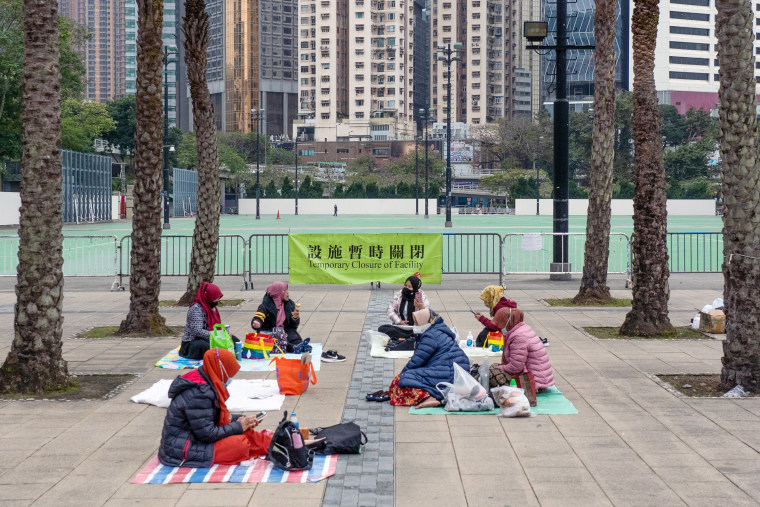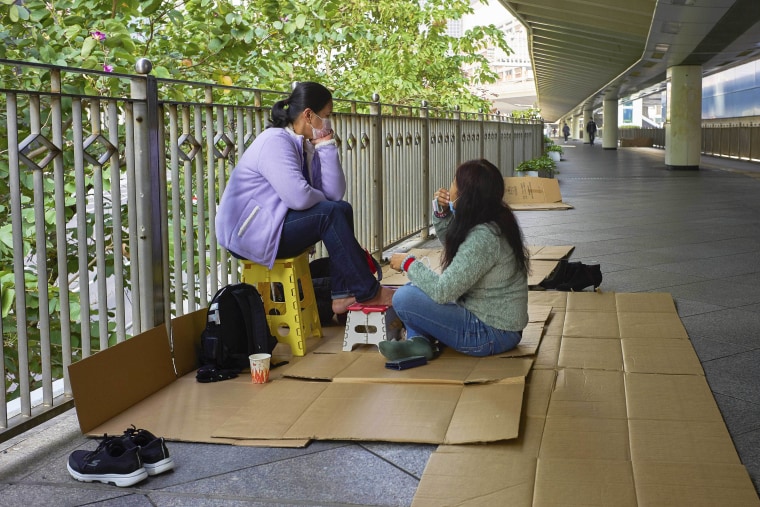HONG KONG — Testing positive for the coronavirus was the last thing “Kay” expected. She was between contracts as a foreign domestic worker in Hong Kong, and she was only getting tested in February so she could fly home to the Philippines the next day for the first time during the pandemic.
Although she had no symptoms, she went to a public hospital to ask whether she should go to a centralized isolation facility in line with the Chinese territory’s “zero-Covid” policy for infected patients. But cases had surged as Hong Kong faced its worst outbreak of the pandemic, and the hospital staff turned her away, saying she should self-isolate at home.
Kay, who had lived with her employer, tried to explain that she didn’t have a home to go back to, but she was still left standing in the rain.
“I didn’t know what to do, where to go,” said Kay, 35, who declined to give her name for fear of jeopardizing future employment in Hong Kong. “This is the first time I had a problem this far from home. I don’t even have family here to ask for help, so it was just like, ‘Why, God, why did you give me this situation? I’m alone.’”
The pandemic has presented special challenges to people like Kay, one of about 340,000 foreign domestic workers in Hong Kong. It has kept them apart from their families in countries such as the Philippines and Indonesia, while exposing them to what advocates say is greater discrimination in Hong Kong amid virus fears and a lack of support if they get infected.
Download the NBC News app for breaking news and politics
During the outbreak this year, driven by the highly transmissible omicron variant of the virus, dozens of domestic workers who tested positive were fired by employers who didn’t want their families to be exposed, said Manisha Wijesinghe, executive director of the local nonprofit group HELP for Domestic Workers.
Domestic workers are legally required to live in their employers’ homes, and the group has provided shelter to Kay and many others who had nowhere to go after they were fired.
That is what happened to “Mary,” 46, after her employers asked her to take an at-home rapid test in February. When the test came back positive, they terminated her contract and told her to leave.
Mary also went to a public hospital to get a formal test done but was told to wait for the results at home. She spent the night near a bus stop during unusually cold weather before a friend sent her the number for Wijesinghe’s group.
“I feel so sad and I feel so upset … because the feeling that you are alone, outside the hospital, the freezing night, so freezing, and you don’t know where to go the second night. I’m just praying for that night,” said Mary, who is from the Philippines and also declined to give her name because she planned to continue to work in Hong Kong.

In an email to NBC News, the Hospital Authority, Hong Kong’s governing body for public hospitals, said the number of Covid patients had skyrocketed during the omicron outbreak. In February, it said, it was decided to “reserve medical resources and isolation beds for the patients who are most in need.”
“Priority was given to elderly and pediatric patients in serious conditions; young patients and those with mild symptoms or no symptoms were asked to stay at home,” it said.
For domestic workers who tested positive but were kicked out of their employers’ homes, that meant sleeping in cars, parks and outside hospitals, according to local media reports. In February, the Hong Kong Labor Department released a statement telling employers to “be compassionate” and not fire domestic workers over their infections.
Critics say the government has itself encouraged discrimination with some of its policies. Domestic workers returning from overseas have been required to stay in specific quarantine hotels rather than choosing their own, and last year the government briefly considered making Covid-19 vaccination mandatory only for domestic workers before backing down in the face of criticism.
In February, Chief Executive Carrie Lam said the government would show “no mercy” in handing out fines to domestic workers accused of violating pandemic restrictions when they gather in public on Sundays, their one statutory day off. The fine of 5,000 Hong Kong dollars, or about $600, is more than a domestic worker’s minimum monthly wage of 4,630 dollars. A crowdfunding campaign to help cover the workers’ fines was shut down after the government threatened legal action.

Both Mary and Kay, whose quarantine periods ended in March, have received counseling after their experiences. Kay was able to travel back to the Philippines to see her family and plans to find a new job in Hong Kong.
Mary was re-employed by the family she worked for earlier, but she says on her Sundays off they allow her to leave the house for only a few hours, afraid that she might contract the virus again. She stays in the small room she shares with another domestic worker for the rest of the day.
Though she is tired and unhappy, she said, she feels she can’t leave her job because she is supporting her family back home.
“So much stress here,” Mary said, adding she is stressed not because of work, but “emotionally and mentally.”
